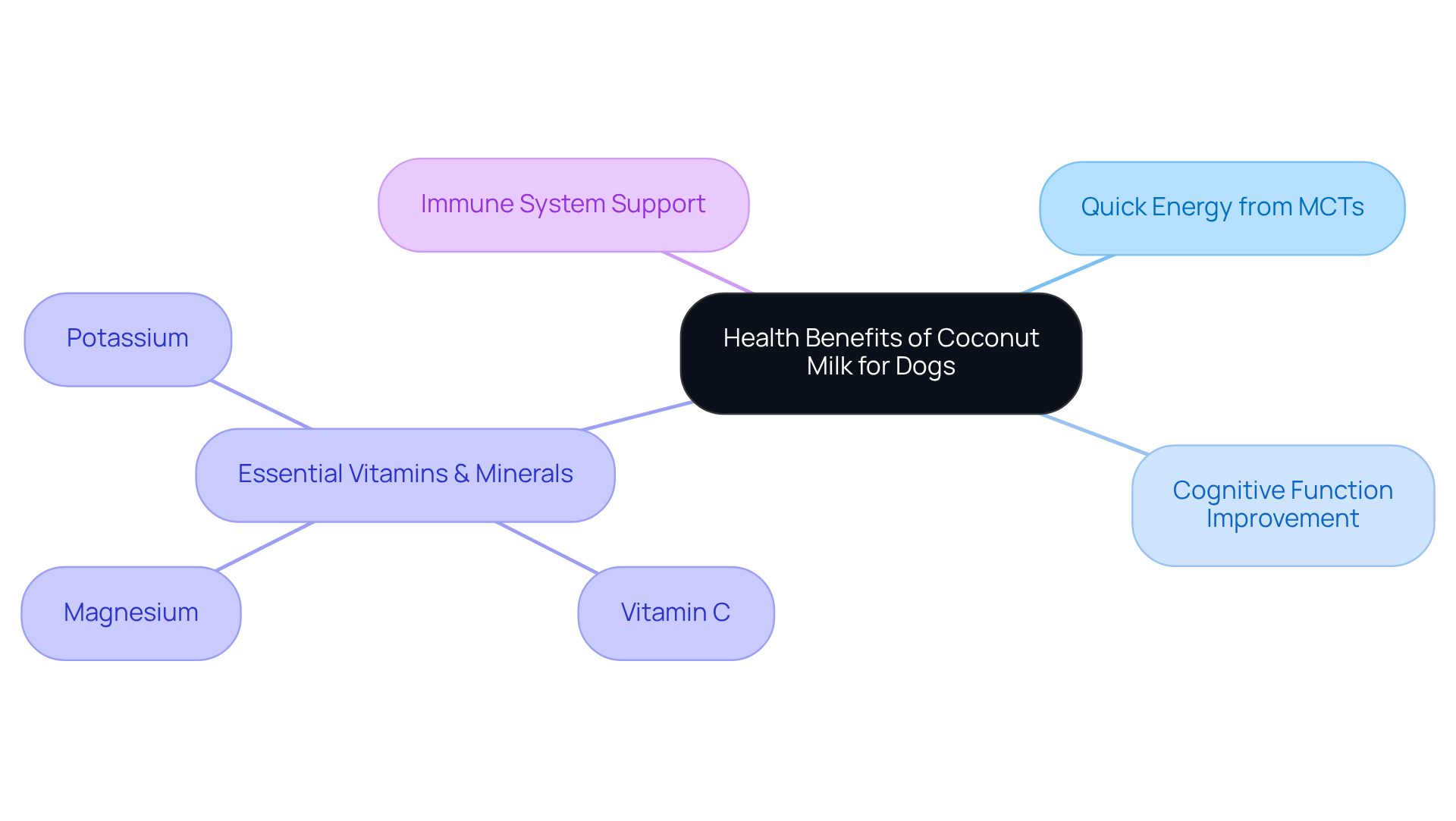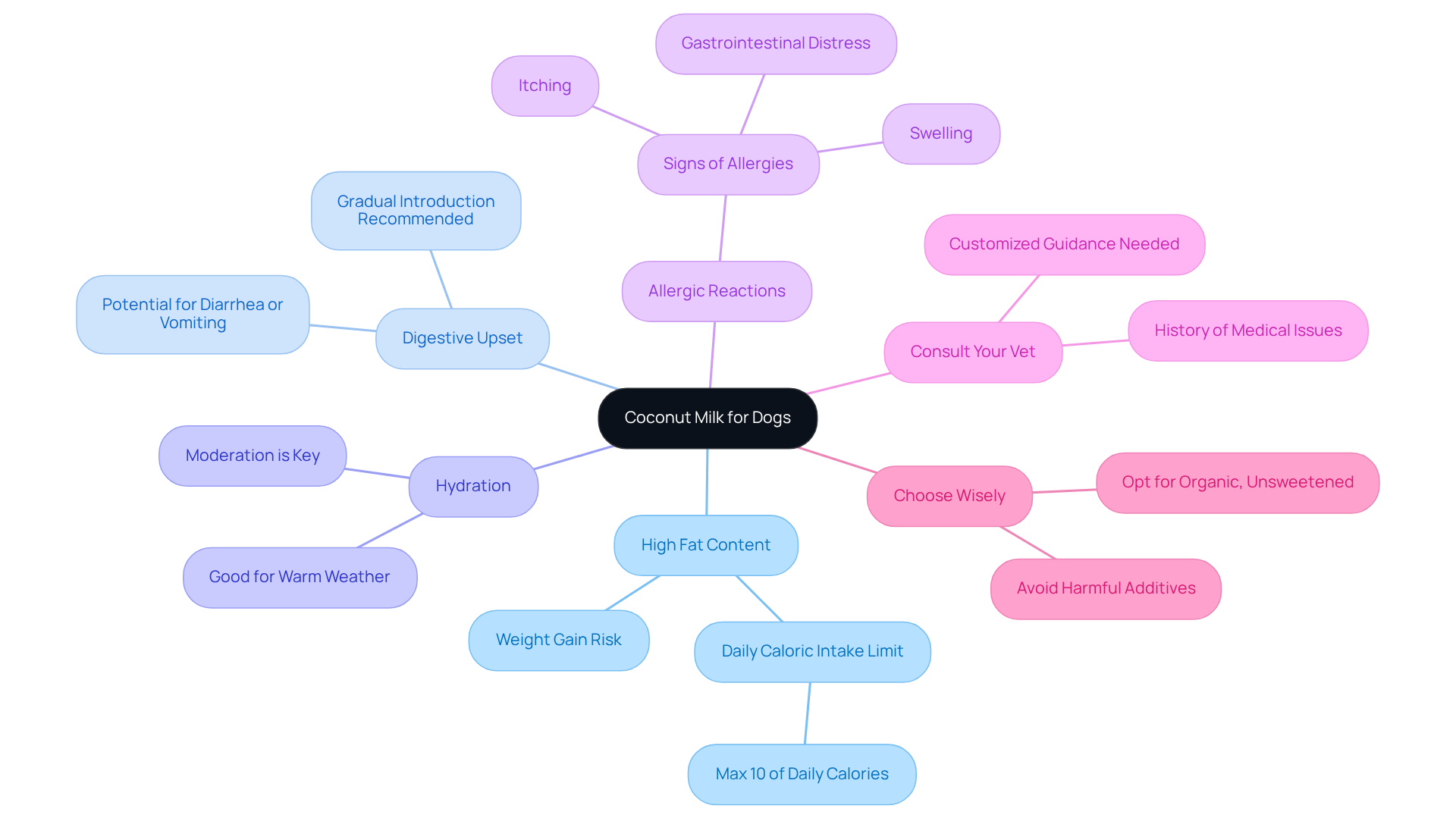Can Dogs Have Coconut Milk? Safe Introduction Steps for Pet Owners
Overview
As a loving pet owner, you might wonder about the foods that can enhance your furry family member’s health. Did you know that dogs can enjoy coconut milk in moderation? When it’s unsweetened and organic, it can offer delightful health benefits, such as improved immune function and radiant skin. However, it’s essential to introduce it carefully and monitor for any adverse reactions.
At Adventure Den, we understand that your pet’s well-being is your top priority. While coconut milk can be a tasty treat, remember that excessive consumption may lead to digestive issues and unwanted weight gain. By introducing this treat mindfully, you can ensure that your beloved companion enjoys it safely.
Consider the joy of seeing your dog thrive with the right care. If you decide to incorporate coconut milk into their diet, take it slow and observe how they respond. Your commitment to nurturing their health is what truly makes a difference in their lives.
Introduction
The question of whether dogs can safely enjoy coconut milk is a concern many pet owners share as they seek to diversify their furry family members’ diets. This creamy, tropical treat offers potential health benefits, such as boosting the immune system and improving skin health, but it also comes with risks that must be navigated with care.
Can you confidently incorporate coconut milk into your dog’s meals without jeopardizing their health? This guide will illuminate the safe introduction of coconut milk, ensuring that your dogs can enjoy its benefits while minimizing any potential downsides.
Assess the Safety of Coconut Milk for Dogs
Before introducing a creamy substance derived from coconuts into your furry family member’s diet, it’s essential to ask, can dogs have coconut milk? Typically, this type of liquid can be safe for dogs when given in moderation, which raises the question, can dogs have coconut milk, ideally limited to just a few ounces daily? Opt for an unsweetened plant-based beverage, as sweetened varieties may contain harmful additives like sugar and artificial sweeteners, which are not suitable for our pets. Always take a moment to scrutinize the ingredient list for any toxic substances, such as xylitol.
Choosing an organic plant-based beverage can also help reduce exposure to harmful pesticides and additives. If your canine has a history of medical issues, especially those affecting digestion or pancreatitis, it’s crucial to consult with a veterinarian to determine if can dogs have coconut milk before adding this tropical delight to their diet. While palm sap may enhance your dog’s immune system and contribute to healthy fur and skin, be mindful that prolonged intake of coconut cream can lead to weight gain and obesity.
Monitoring your dog for any gastrointestinal issues, such as an upset stomach or loose stool, is important to ensure a safe and enjoyable experience for your beloved pet. Remember, your furry family members deserve the best care, and being cautious will help you maintain their health and happiness.

Explore the Health Benefits of Coconut Milk
When incorporated thoughtfully, coconut liquid can offer your furry family members a range of wellness advantages, which raises the question, can dogs have coconut milk? It contains medium-chain triglycerides (MCTs), which are healthy fats that provide quick energy and may enhance cognitive function. Moreover, this delightful beverage derived from coconuts is rich in essential vitamins and minerals, including vitamin C, magnesium, and potassium, all of which support overall health.
Research suggests that the antioxidants found in coconut liquid may help boost the immune system, potentially reducing the risk of infections. However, it’s crucial to remember that these benefits shine brightest when this nourishing drink is served in moderation, particularly when asking can dogs have coconut milk. By being mindful of your dog’s needs, you can create a nurturing environment that promotes their well-being.

Implement a Step-by-Step Introduction of Coconut Milk
To safely introduce coconut milk into your dog’s diet, consider these caring steps:
- Choose the Right Product: It’s important to select organic, unsweetened plant-based liquid. This choice helps avoid harmful additives, ensuring your furry family member’s health and well-being.
- Start Small: Begin with just a teaspoon of organic, unsweetened tropical cream mixed into your dog’s regular food. This gradual introduction allows their digestive system to adjust comfortably.
- Monitor Reactions: After this initial introduction, closely observe your dog for any signs of digestive upset, such as diarrhea or vomiting. If any negative reactions occur, please discontinue giving the fluid and consult your veterinarian for guidance.
- Gradually Increase: If your dog tolerates the initial amount well, you can slowly increase the serving size over a week or two. Aim for a few tablespoons, depending on your dog’s size and tolerance. A helpful guideline is one teaspoon of palm cream per 5 kg of body weight.
- Include in Treats: You can also utilize plant-based cream in homemade dog treats or as a delightful topping for their regular food. This can enhance its appeal and make mealtime even more enjoyable for your beloved pet.
- Stay Consistent: Once your dog has adapted, you can provide a plant-based drink occasionally as a treat. Just ensure it complements their regular diet rather than substituting it. Always consult your veterinarian regarding whether can dogs have coconut milk before adding new foods to your dog’s diet, especially if your furry family member has existing health issues or dietary restrictions.
By following these thoughtful steps, you can nurture a loving environment for your dog while introducing new flavors safely.

Identify Risks and Precautions When Feeding Coconut Milk
Coconut milk can be a delightful addition to your furry family members’ diet, but it’s important to be aware of certain risks and precautions to ensure their well-being:
-
High Fat Content: Coconut liquid is rich in fat, which can lead to weight gain and digestive complications if consumed in large quantities. It’s essential to monitor your dog’s overall fat intake, especially regarding the question of can dogs have coconut milk, ensuring that it does not exceed 10% of their daily caloric intake to prevent health issues.
-
Digestive Upset: For dogs with sensitive stomachs, consuming coconut milk may result in diarrhea or vomiting. To minimize this risk, introduce it gradually and in small portions while closely observing your dog’s reaction to see if can dogs have coconut milk.
-
Hydration: Coconut beverage can be hydrating, prompting the question of whether can dogs have coconut milk, making it a wonderful addition to your dog’s diet during warm weather. However, it should still be given in moderation to maintain balance, particularly when asking, can dogs have coconut milk?.
-
Allergic Reactions: Though rare, some canines may have sensitivities to coconut. Be vigilant for any signs of an allergic reaction, such as itching, swelling, or gastrointestinal distress, and discontinue use if these symptoms occur.
-
Consult Your Vet: If your dog has a history of pancreatitis or other medical issues, it’s wise to consult your veterinarian regarding can dogs have coconut milk before adding it to their diet. They can provide customized guidance based on your dog’s specific wellness requirements.
-
Choose Wisely: Opt for organic, unsweetened coconut milk to avoid harmful additives that could negatively impact your dog’s health.
By taking these precautions, you can create a nurturing environment for your beloved pet, ensuring they enjoy the benefits of coconut milk safely.

Conclusion
Introducing coconut milk into your dog’s diet can be a rewarding experience when approached with care and knowledge. This creamy beverage, rich in nutrients, offers various health benefits when given in moderation. However, ensuring the safety of your furry family member is paramount, as improper introduction or excessive consumption may lead to health issues.
Throughout this guide, we have discussed essential points, including:
- The importance of selecting organic, unsweetened coconut milk
- Starting with small portions
- Monitoring for any adverse reactions
Understanding the potential benefits, such as improved immune function and energy levels from medium-chain triglycerides, is crucial, as is recognizing the risks, including digestive upset and high fat content.
Ultimately, the decision to incorporate coconut milk into your dog’s diet should be made thoughtfully and with the guidance of a veterinarian, especially for dogs with pre-existing health conditions. By taking the necessary precautions and following a step-by-step introduction process, you can safely enhance your dog’s diet while ensuring their overall well-being. Embracing this approach not only promotes a healthier lifestyle for your pets but also strengthens the bond between dogs and their owners through shared, enjoyable experiences.
Frequently Asked Questions
Can dogs have coconut milk?
Yes, dogs can have coconut milk, but it should be given in moderation, ideally limited to just a few ounces daily.
What type of coconut milk is safe for dogs?
Unsweetened plant-based coconut milk is safe for dogs, as sweetened varieties may contain harmful additives like sugar and artificial sweeteners.
What should I check before giving coconut milk to my dog?
Always scrutinize the ingredient list for any toxic substances, such as xylitol, and consider choosing organic options to reduce exposure to harmful pesticides and additives.
Should I consult a veterinarian before giving my dog coconut milk?
Yes, if your dog has a history of medical issues, particularly those affecting digestion or pancreatitis, it’s crucial to consult with a veterinarian before introducing coconut milk into their diet.
What are the benefits of coconut milk for dogs?
Coconut milk can enhance your dog’s immune system and contribute to healthy fur and skin.
Are there any risks associated with giving coconut milk to dogs?
Prolonged intake of coconut cream can lead to weight gain and obesity, and it’s important to monitor your dog for any gastrointestinal issues, such as an upset stomach or loose stool.







